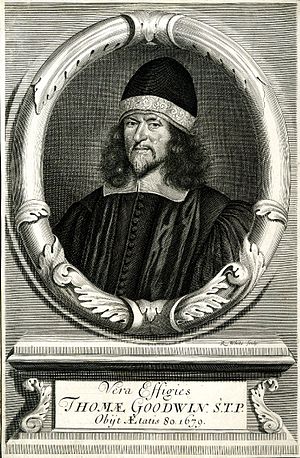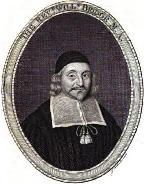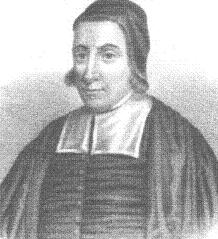Hanserd Knollys (1599-1691) was born in Cawkwell, Lincolnshire. He studied at Catherine Hall, Cambridge where his contemporaries included John Arrowsmith, Thomas Goodwin. He was a school master at Gainsborough before being ordained. He became a minister at Humberston in. Lincolnshire.
During his time there he prayed for a widow who was at death's door - she was healed. In 1631 he married Anne Cleney. He became increasingly concerned about many Anglican practices and eventually gave up his living. He then doubted the validity of his ordination. During this time he met the Puritan John Wheelwright and Knollys came to a saving faith.
In 1633 Knollys was arrested for being a dissenter. He was let released and then made his way to Boston in Massachusetts in 1691. On the 12 week sail his only child died.
In 1641 he returned to England to care for his ageing father and returned to teaching. When the civil war broke out he briefly joined the army but soon became disillusioned and returned to London where he joined the Henry Jessey's congregation. There became convinced that infant baptism wasn't biblical. This led to the formation of the Particular Baptists. Two Particular Baptist congregations developed one led by Knollys and the other by William Kiffin.
Knollys rejected the Presbyterian model of church and adopted a congregational model. Knollys advocated a High Calvinism and a closed communion. He was unjustly accused of being an antinomian after signing the reprint of Tobias Crisp's sermons.
During this time the Particular Baptists experienced much growth. Knollys travelled around the country helping to set up many local churches.
After the restoration of the monarchy and Charles II came to the throne it meant persecution for many non-Conformists, Knollys included. He was imprisoned many times. He spent some time in Holland and in Germany but returned to London after two or three years.
In the late 1660s he wrote several books advocating a historical approach to Revelation. He became convinced that mystical Babylon was papal Rome. He was a post millennialist.
In 1670 he was again put into prison but was allowed to preach to the prisoners.
In 1677 the Knollys and the London Particular Baptists published a new confession of faith - it was published in 1689 when William and Mary ascended the throne. Knollys and Kiffin were the only two that signed both the first and second London Confessions.
He died in 1691 and was buried in bunhill Fields, London.
Further reading
Michael A. G. Haykin (1996) Kiffin, Knollys, Keach: Rediscovering our English Baptist Heritage. Leeds: Reformation Today Trust.
Barry H. Howson (1998) 'Hanserd Knolleys (c. 1598-1691)' In Michael A. G. Haykin The British Particular Baptists 1638-191 Volume 1. Springfield, MI: Particular Baptist Press.











